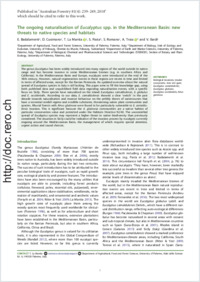The ongoing naturalisation of Eucalyptus spp. in the Mediterranean Basin: new threats to native species and habitats
- Badalamenti, Emilio Department of Agricultural, Food and Forest Sciences, University of Palermo, Italy
- Cusimano, D. Department of Agricultural, Food and Forest Sciences, University of Palermo, Italy
- Mantia, Tommaso La Department of Agricultural, Food and Forest Sciences, University of Palermo, Italy
- Pasta, Salvatore Department of Biology, Unit of Ecology and Evolution, University of Fribourg, Switzerland
- Romano, S. Department of Earth and Marine Sciences, University of Palermo, Italy
- Troia, Angelo Department of Biological, Chemical and Pharmaceutical Sciences and Technologies, Section of Botany and Plant Ecology, University of Palermo, Italy
- Ilardi, V. Department of Earth and Marine Sciences, University of Palermo, Italy
-
02.10.2018
Published in:
- Australian Forestry. - 2018, vol. 81, no. 4, p. 239–249
English
The genus Eucalyptus has been widely introduced into many regions of the world outside its native range and has become invasive in some Mediterranean biomes (e.g. in southern Africa and California). In the Mediterranean Basin and Europe, eucalypts were introduced at the end of the 18th century. However, natural regeneration events in these regions are recent in time and limited in terms of affected areas, except for the Iberian Peninsula. An updated overview about the natural spread of Eucalyptus species in Italy is still lacking. This paper aims to fill this knowledge gap, using both published data and unpublished field data regarding naturalisation events, with a specific focus on Sicily. Three species have naturalised on the island: Eucalyptus camaldulensis, E. globulus and E. occidentalis. According to our data, E. camaldulensis showed a clear ‘switch’ in the past decade towards naturalisation and invasive behaviour on the pebbly shores of watercourses that have a torrential rainfall regime and erodible substrates, threatening native plant communities and species. Alluvial forests with Alnus glutinosa were found to be particularly vulnerable to E. camaldulensis invasion. This is significant because the A. glutinosa communities are a native habitat of particular conservation value and protected under the Habitats Directive 92/43. The uncontrolled spread of Eucalyptus species may represent a higher threat to native biodiversity than previously considered. The situation in Sicily could be indicative of the invasion process by eucalypts currently ongoing around the Mediterranean Basin, the management of which requires special attention, urgent action and sound choices.
- Faculty
- Faculté des sciences et de médecine
- Department
- Département de Biologie
- Language
-
- English
- Classification
- Biological sciences
- License
-
License undefined
- Identifiers
-
- RERO DOC 323811
- DOI 10.1080/00049158.2018.1533512
- Persistent URL
- https://folia.unifr.ch/unifr/documents/307264
Statistics
Document views: 132
File downloads:
- pdf: 773
